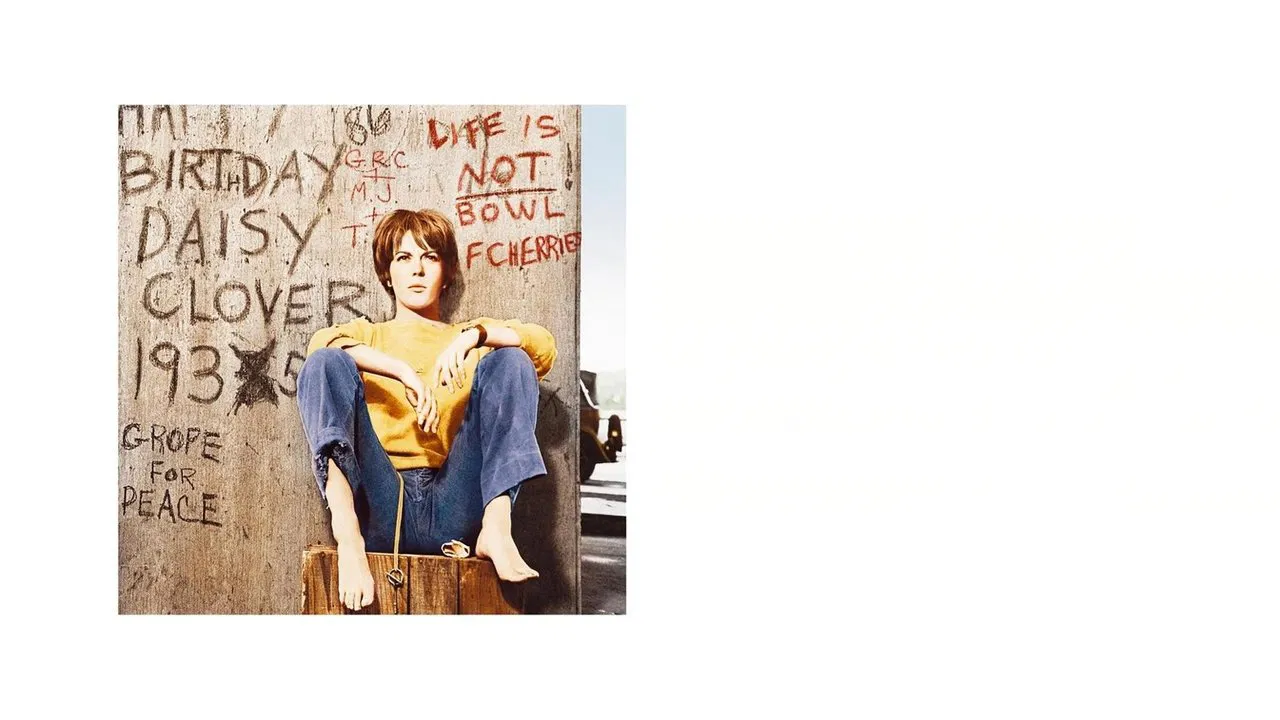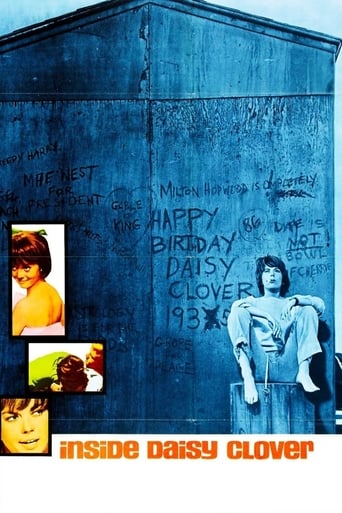

Inside Daisy Clover, although it starts off a little dazed, is a solid story of the harsh, sometimes rotten world of Hollywood. Daisy Clover is a street urchin with a golden voice and gets unbelievably lucky when she is signed to be a star. She navigates the realm of celebrity with the naivety of any uneducated fifteen year old but grows in wisdom and strength as the industry and the people who work within it take advantage of her inexperience and vulnerability. Natalie Wood shows a more serious side of her talent as she expertly and believably suffers through the world that every kid dreams of. Her pathos and subtly pull you into the plight of her character without it feeling overbearing or melodramatic. Almost without a cohesive storyline--the movie plays out more like a year in the life--but with a plethora of misdeeds that happen to our young heroine, I promise that you will be glued to your seat, hoping that she will not be swallowed up by the greed and manipulation that stardom breeds. 7/10
... View MoreBased on the 1963 novel of the same name by Gavin Lambert who adapted it for the screen, this is a brilliantly made damning indictment of the inherent insincerity of Hollywood. The film takes place in the Golden Age from 1936 to 1938 at the height of the studio system but many of its criticisms of Tinseltown were readily applicable to the 1960s and some even apply to 2016. It has a first rate script which does not pull any punches and the direction of Robert Mulligan, whose forte was sensitive period dramas, is wonderful. The film stars Natalie Wood in an utterly fantastic performance as Daisy Clover, a 15-year-old tomboy and livewire who lives in a dilapidated trailer on Angel Beach in California with her highly eccentric mother. Like many teenage girls in the 1930s, she dreams of making it big in Hollywood. When she sends a recording of her voice to the highly prestigious Swan Studios, her dreams come true and she is signed by the movie mogul Raymond Swan. However, she soon learns that fame is not all that it is cracked up to be as Swan and his wife Melora manipulate her at every turn in order to protect her burgeoning career and reputation. Most notably, they have her mother Lucile, otherwise known as the Dealer and played in a great performance by Ruth Gordon, committed to a mental institution after she nearly burns down her trailer and put out the cover story that she is dead. The Dealer may not exactly be June Cleaver but Daisy adores her mother and she is rightly extremely angry and upset when Swan tells her that she cannot see her anymore, though he eventually relents. Her death is the catalyst for Daisy's nervous breakdown later in the film but there were certainly other contributory factors. There are traces of many Hollywood starlets in Daisy. Her nickname of "America's Little Valentine" is reminiscent of Mary Pickford's "America's Sweetheart." In that she is much used and abused particularly by men, however, the similarities to the recently deceased Marilyn Monroe are the most pronounced. At 27, Wood was too old to play a 15-year-old but the strength of her performance is so strong that I forgot about the large age gap between actress and character after the first ten minutes. Of course, she first found success as a child star in the 1940s but I hope that her rise to stardom was less painful than Daisy's. She should have received a Best Actress nomination for the role.Although he is a little over the top in a few instances, Robert Redford, in one of his first major roles, is nevertheless very good as Daisy's fellow Swan Studios star Wade Lewis. A swashbuckling action hero in the mould of Douglas Fairbanks and Errol Flynn, he is the apple of every teenage girl's eye and women wish that their husbands were exactly like him. Wade is such an interesting character as he really represents the stark difference between reality and Hollywood-style illusion. He wines and dines Daisy and uses the considerable charm at his disposal to get her to marry him. However, only after he leaves her in a dirty little Arizona motel does she learn the truth: he's gay and their marriage was one of convenience to hide that fact. This was likely inspired by Rock Hudson's marriage to Phyllis Gates in 1955, not least because Gates did not know that he was gay when they got married. Although it was unknown to the general public in the 1960s, his homosexuality was an open secret in Hollywood. There is some suggestion in the film that Wade may be bisexual but I do not believe that this is the case. He is an actor and he was merely playing the role that other people would have him play when he pretended to be attracted to Daisy. I get the feeling that we never get to see the real Wade as his sexuality means that he can never let his guard down as his career would be finished overnight. Unsurprisingly for the time, none of the words that I have used were used in the film but it is notable for depicting a gay man who was comfortable with his sexuality. He hides it for professional rather than personal reasons. When he first meets Daisy, he tells her that his real name is actually Lewis Wade as opposed to Wade Lewis and that is the only thing that the studio changed about him, which can be seen in retrospect as a defiant reference to his sexuality. In spite of his callous behaviour, I certainly do not think that Wade is a bad man but merely one is extremely self-centred.Although Redford has the most interesting role of any man in the film, the male lead is the great Christopher Plummer in an excellent performance as Raymond Swan. He presents himself as a warm, caring man to the outside world but this is merely a veneer. Swan is a ruthless Hollywood mogul who cares nothing for Daisy as a person, only as a money maker for his studio. He is verbally and physically abusive to her after she has her breakdown as his continued convalescence is costing him a great deal of money since she still has to finish her last film. He then tells her that he does not care what happens to her so long as she fulfills the terms of her contract. The only other actors to particularly stand out are Katharine Bard as Melora, who seems to be a very collected woman for most of the film until we find out that she attempted suicide when she found out that Wade was gay, and Roddy McDowall as Swan's assistant Walter Baines.Overall, this is an excellent film which very effectively excoriates the falsity and artificiality of the Dream Factory.
... View MoreI admit I haven't read all the reviews of this movie, but of the ones I did read I was surprised to find that nobody mentioned that Natalie Wood has only about 12 lines of dialogue in a film in which she is the star. And to top it off, most of those lines make no sense in the context of the scene! The whole movie is like one big parade of soliloquies, where a character walks into the room and starts talking to, not with, Ms. Wood, and all she does is sit there and glare at them. She doesn't even talk to herself after they leave.I don't know what the director was going for but unfortunately God gave Ms. Wood a completely expressionless face, so we as the audience have no way of knowing what she's thinking during all these one-sided conversations. Once in a while her eyebrows will move or she'll attempt a half-smile, but other than that she never says, "Hello, how are you?" or "What are you doing here?" or "Get out before I kill you!" She doesn't even move her arms or shift position. It's as though the screenwriters forgot that she was even in the film. The lawn furniture showed more depth and emotion than Ms. Wood.As an example of how ridiculous Ms. Wood's line are when she has any at all, take this scene: Daisy just got married to Wade Lewis and they check into a motel in the middle of nowhere for their honeymoon. Instead of saying something like, "I love you Wade, with all my heart, and this is the happiest day of my life!" she says, "I'm going to learn how to cook! And not just fishburgers either." Huh? Where in the heck did that come from? Daisy Clover's signature song is "You're Gonna Hear From Me." Not in this movie they won't. This thing stunk worse than yesterday's leftover fishburgers.
... View MoreThis is a great film. It is an almost satirical and comic look at "stardom" in Hollywood during the 1930s. Wood (in her mid to late 20s at the time) plays a teenager living in poverty in L.A. She has a great voice, and is discovered. The next thing you know she is the second coming of Judy Garland. She is exploited and used in every way. Christopher Plummer plays the tyrannical studio boss who bullies and intimidates her to make the most profit possible out of her stardom. Hia character is so brutally cynical and calculating.Robert Redford plays a Prima Donna actor who has no sincerity and no conscience. In an infamous scene, he leaves his wife (Wood) stranded at a motel in the middle of the desert. He is a charmer, but he is someone who has no conscience or sense of decency. He is all about his perceived stardom, which is probably on the wane at the time.I especially like Wood's role. She was able to show such depth and extremes of emotions. If her voice wasn't dubbed, she had a great voice, too. The best highlight of her talent is when she starts going insane over her fame. This role made me realize what a great actress she was.I also liked the subtle humor in the movie. It was obviously satirizing the inaneness of Hollywood. The musical songs were so brilliantly silly and simple minded. It reminded me of the songs in the movie Nashville. I liked many other scenes where it was obvious that the creators of this film were having a good time poking fun of Hollywood.
... View More